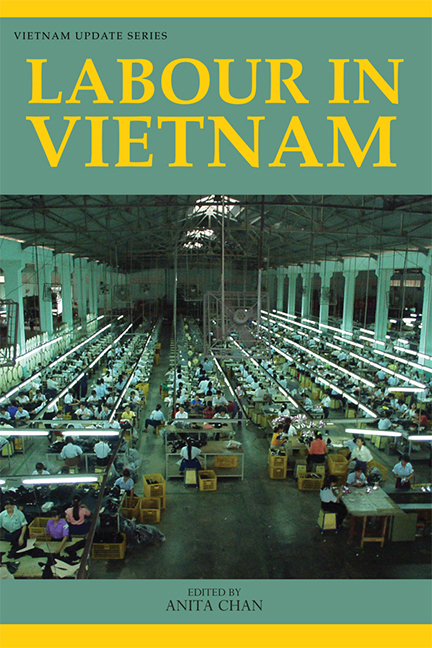Book contents
- Frontmatter
- Contents
- List of Tables and Figures
- Abbreviations
- Acknowledgements
- The Contributors
- 1 Introduction
- 2 “Awakening the Conscience of the Masses”: The Vietnamese Confederation of Labour 1947–75
- 3 State Enterprise Workers: “Masters” or “Commodities”?
- 4 The Redivision of Labour in a Red River Delta Village in a Globalized Economy
- 5 Corporate Social Responsibility in Socialist Vietnam: Implementation, Challenges, and Local Solutions
- 6 Workers' Protests in Contemporary Vietnam
- 7 Strikes in Vietnam and China in Taiwanese-owned Factories: Diverging Industrial Relations Patterns
- 8 The Dynamics of a Multinational Factory Regime and Recent Strikes in Vietnam
- 9 How Does Enterprise Ownership Matter? Labour Conditions in Fashion and Footwear Factories in Southern Vietnam
- 10 Exploitative Recruitment Processes and Working Conditions of Vietnamese Migrant Workers in Taiwan
- Index
1 - Introduction
Published online by Cambridge University Press: 21 October 2015
- Frontmatter
- Contents
- List of Tables and Figures
- Abbreviations
- Acknowledgements
- The Contributors
- 1 Introduction
- 2 “Awakening the Conscience of the Masses”: The Vietnamese Confederation of Labour 1947–75
- 3 State Enterprise Workers: “Masters” or “Commodities”?
- 4 The Redivision of Labour in a Red River Delta Village in a Globalized Economy
- 5 Corporate Social Responsibility in Socialist Vietnam: Implementation, Challenges, and Local Solutions
- 6 Workers' Protests in Contemporary Vietnam
- 7 Strikes in Vietnam and China in Taiwanese-owned Factories: Diverging Industrial Relations Patterns
- 8 The Dynamics of a Multinational Factory Regime and Recent Strikes in Vietnam
- 9 How Does Enterprise Ownership Matter? Labour Conditions in Fashion and Footwear Factories in Southern Vietnam
- 10 Exploitative Recruitment Processes and Working Conditions of Vietnamese Migrant Workers in Taiwan
- Index
Summary
It has been three decades since Vietnam began to liberalize its planned economy and two-and-a-half decades since the policy of Doi Moi (renovation) was officially introduced. Today, alongside China, Vietnam is an “economic miracle” — a Communist Party-led state that has successfully transformed its economy and whose export industry is internationally competitive. With an average GDP growth rate of almost 7 per cent over this entire period of transformation, Vietnam is one of the fastest-growing economies in the world. It has become an attractive destination for foreign direct investment (FDI) in good part because Vietnamese labour is considered “cheap”, at about half the wage level of China.
Rapid urbanization and industrialization could not take place in Vietnam without a growing industrial labour force, and it is this new “proletariat” under Doi Moi that is the subject of this volume. “Proletariat” is used here as a reminder that Vietnam still calls itself a socialist state, and it is within this context that this Introduction is situated. As will be seen, in the view of one of the contributors, Michael Karadjis, for the time being Vietnam's state-sector workers are still in a halfway house.
VIETNAM AND THE ASIAN MARKET-SOCIALISM DEVELOPMENT MODEL
In the early 1990s, shortly after the collapse of the communist one-party regimes of the Soviet Union and Eastern Europe, the question arose as to what would occur in the last two remaining socialist countries that counted — Vietnam and China. By then, both countries were embarking on the road to “market socialism”. Where would their political, economic, and social transformation lead them? Would they be able to succeed in their “latecomer” development projects (see Woodside 1999)?
Twenty years on, these two states have jumped the hurdle of late development and have been able to catch up on lost time. Still using fiveyear plans, but minus the hitherto authoritarian and rigid top-down methods of implementation, they have succeeded in transforming themselves from the status of poor Third World countries into what are today known as newly emerging economies.
- Type
- Chapter
- Information
- Labour in Vietnam , pp. 1 - 12Publisher: ISEAS–Yusof Ishak InstitutePrint publication year: 2011

